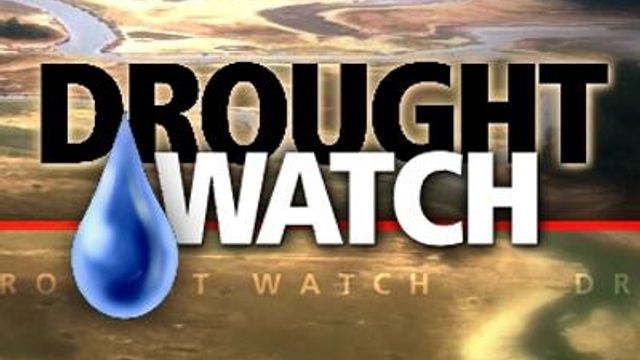Flush Plates, Not Toilets in Prolonged Drought
As the rainfall deficit across the Triangle reached new levels for the year, area officials discussed further lifestyle changes that might be required of residents to conserve as much water as possible.
Posted — UpdatedA rainfall of 0.01 inches on Thursday brought up the year's deficiet at Raleigh-Durham International Airport, but only to 9.79 inches – still in record terrority. Long-term forecasts call for below-normal precipitation to continue in the coming months.
Nine counties are in extreme drought, the next level down, and 13 are in severe drought.
"One rain is not going to end this drought. It's going to take a while," Thompson said.
If there's no rain in the next 30 to 45 days, Mayor Charles Meeker said the city would take even more extreme measures.
"There'll likely be a request for paper plates instead of washing china, limitations on flushing toilets – things we're not used to but may have to go to," Meeker said.
That would require resturants to set out plastic silverware and paper plates, instead of fine china. Van Eure said that would not be a problem at the popular Angus Barn in Raleigh.
"We'll serve the same quality food, we'll have the same quality service," Eure said. "But we'll serve on nice paper plates or recycleable plastic plates, because we recycle everything here."
The city also could implement tiered water rates to penalize households that consume too much water. The threshold for a family would be about 3,000 gallons a month, he said.
"(We) likely will have some kind of tiered rate during this time so that if you use more than a certain amount in a house, then you'd pay more," he said.
The Triangle J Council of Governments, which is made up of mayors and county commissioners from across the region, met Thursday afternoon to discuss long-term solutions to the state's worsening water woes.
The Council's water resources manager Sydney Miller sounded an alarm about the pace of the advancing drought and urged local leaders to fix their old infrastructure to avoid wasting water.
Durham sees 13 percent, or 1.3 million gallons, of its daily water demand go down the drain due to such problems as leaky pipes. For similar reasons, Raleigh loses more than 3 million gallons, or 3 percent of its daily demand.
"Reservoir levels, even if they come up somewhat over this winter and into the spring, are going to drop even faster next summer than they did this summer," Miller said.
"We're all going to have to roll up our sleeves to address these needs and issues," Durham County Commissioner Ellen Reckhow said.
If the drought continues to escalate quickly and consumption levels remain the same, Raleigh could move to Stage 3 water restrictions, Meeker said.
"What was surprising is how quickly we can get into a serious drought in the Triangle," he said. "In two or three months, you can go from a normal situation to being in a severe drought."
With the drought expected to stretch well into 2008, Miller said people also should avoid outdoor planting next spring.
"Is it more important to have green grass, or is it more important to have jobs and have drinking water?" Miller said. "No one should be planting next spring. I wouldn't plant anything until next fall, and ... don't expect to water next year."
Some people called for caps on growth, noting increased populations have led to increased demand on area reservoirs.
"People like to use the analogy, well, you came here, and you want to close the gate. The other analogy is, if you get too many people in the lifeboat, everyone drowns," Orange County Commissioner Barry Jacobs said.
The state would likely have to help fund some of the solutions because local governments don't have the finances to pay for the cost of the drought, Reckhow said.
Gov. Mike Easley has resisted declaring a statewide emergency and putting limits on consumption at the water system level, saying he believes the drought is manageable through voluntary conservation.
"What you'd rather do is get people to voluntarily conserve," he said.
• Credits
Copyright 2024 by Capitol Broadcasting Company. All rights reserved. This material may not be published, broadcast, rewritten or redistributed.






